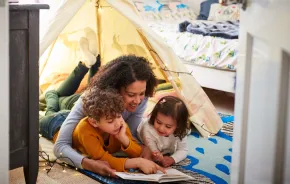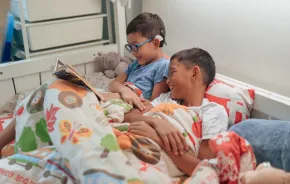
I used to be one of those women who swore my kids wouldn’t have tablets and cell phones before they were in high school.
That was before I had kids.
Go ahead and laugh, because I have certainly mocked my child-free self a lot in the past couple of years. Not because it’s impossible to keep tech out of my kids’ hands, but because technology is simply an ever-expanding part of life in the 21st century.
Ignoring that, as I see some friends do when they deny their kids access to technology (while posting about it from their smartphones), feels as silly as rejecting automobiles in favor of horse and buggies, or traveling by ship rather than by plane.
My two sons are 6 and 8 years old and they’re already using computers and tablets and even 3D printers in elementary school. My husband is a tech geek who teaches middle school technical education, which covers everything from coding to robotics. To say we are a technology-embracing family would be an understatement.
But because there seems to be a kind of a collective angst among parents over kids and technology, I still had concerns about how much screen time my kids were getting or when they should have access to various kinds of technology, including cell phones.
That all changed last summer, quite by accident.
My youngest son wanted to play Pokemon Go and I wasn’t keen on letting him use my new iPhone for a game. My husband let him borrow an old cell phone that still had an active phone number. Shortly after that, my older son also wanted to play a game and asked for his own phone. My husband already had his eye on a new cell phone anyway because his screen was cracked, so he passed that phone on to my older son. Suddenly, both of my kids had smartphones that they were able to use when we were running around on weekends and they were bored in the car.
They used the phones in different ways. Since my younger son’s phone still had a working phone number, he became interested in making phone and video calls, as well as texting. My introverted older son is more interested in games than in making calls and sending texts, though my husband added a texting app to his non-working phone so that he could text over wifi, if he wanted to.
This came in handy when he was sick earlier in the school year and I needed to pick his brother up from school. He asked to stay home alone — a first — because he felt like he could reach me if he needed to. Seeing how proud he was to be independent and on his own supported my belief in encouraging my kids to use technology.
They know that 'don’t talk to strangers' applies in digital life as well as real life. As they get older, there will be more conversations.
While my older son can’t make phone calls from his phone and my younger son has been told to ask first before making a phone call, they are free to text the few people we’ve approved whenever they want.
My younger son nonchalantly informed me one afternoon that he had texted my husband to ask him to pick up lemonade on the way home from work. Yesterday, he texted his babysitter to ask when she’d be coming over. Watching how my once-shy preschooler has gotten comfortable initiating communication is as big a deal as my older son feeling comfortable at being home alone. This is how I want them to see technology — as a tool to improve their lives, as it has improved mine.
I’ve gotten some pushback from friends who think cell phones (and tablets) should be heavily restricted. But giving my kids unlimited access to tech hasn’t made them lose interest in swinging in the backyard or building LEGO creations or having Nerf battles. They’ve had phones for a year now and they still primarily use them to play games or watch videos on YouTube Kids — the same things they use their tablets for. And they leave their phones untouched for days at a time, probably in part because they’re too young for social media and friends aren’t asking for their phone numbers.
As for safety: They’re learning about internet safety at school, and how to search the internet using a filtered browser, and we reinforce these lessons. They know that “don’t talk to strangers” applies in digital life as well as real life. We have conversations about the fact that they’re very young to have access to this technology and that not all of it is appropriate for them.
They understand, and will often tell me about a particular game or video they don’t think they should play or watch, self-moderating before I’ve even had a chance to say “no.” As they get older, there will be more conversations.
We’ll start some new experiments this summer. Watching them learn how to make stop-motion videos has inspired me to find new educational ways to encourage them to use their cell phones. We’ll be traveling this summer, including spending a week in Chicago to visit friends and probably another week near the beach. Their summer project is going to be to document their travels, in photos and videos and text stories saved as notebook entries.
My younger son enjoys the real-time weather feature that was recently added to Pokemon Go, so I’m going to encourage them to use a real weather app to determine the upcoming forecast for where we live and where we’re visiting, which will reinforce the calendar reading skills they’re learning in school. My older son studied how to use a compass earlier in the school year, so the plan is to teach them to use map apps so they can follow along when we travel. How cool it would be if they could identify the landmarks of Chicago even before we see them?
I hope that by giving them more freedom to use real-world apps they’ll not only pick up some new skills and interests, but find practical ways to apply what they learn even once they go back to school in the fall. Yes, they still need supervision, but I want to teach them how to make the best use of the technology they have at their fingertips — and use their imaginations to see where that technology can take them.
I also know that when we say it’s time to go to the pool or the park, that the phones will be forgotten in a mad dash to get outside and play.











